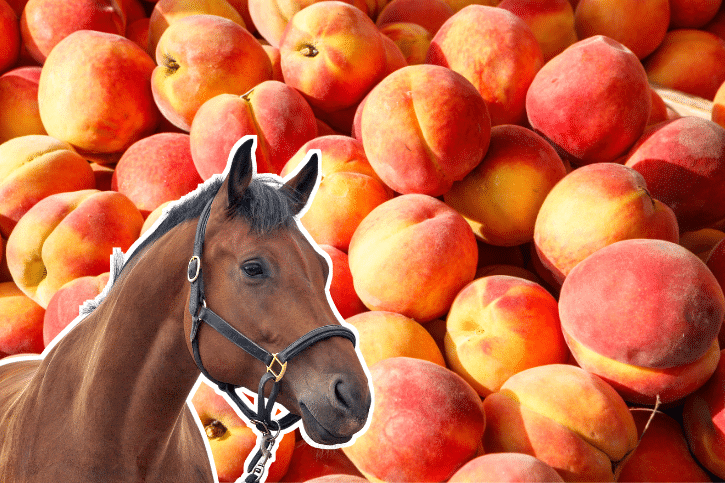Can Horses Eat Peaches?
I was out for a drink with some friends the other night when I saw a peach mimosa on the menu.
It sounded great and I had to try it.
I don’t know why but I’d always had an aversion to actually eating peaches.
I loved the taste but couldn’t stand the texture.
So, in drink form it’s great for me.
Tasting peach for the first time in a while did get me thinking, though, about whether or not it would be a good treat for my horses.
I love to provide them with small amounts of fresh fruit and veg as a snack.
But I always like to be sure it’s safe first, so I decided to look into it first.
So, can horses eat peaches?
Yes, peaches make a great treat for your horse in small quantities. Fruits can be very high in sugar, and horses need a primarily fibrous diet, but they will love peaches occasionally. Peaches are rich and tasty and your horse will love them. Just don’t overfeed them, as it’s very easy to do with something they’ll love.
There are some caveats, such as how you should prepare the peaches first.
Other than that, very few fruits do pose any serious danger for horses, and they will enjoy most of them a lot.
Moderation is always key, and fresh fruit should only make up a small part of their diet.
What are the benefits of peaches for horses?
Peaches are not short on health benefits for horses.
They’re packed with antioxidants, which are beneficial plant compounds that combat oxidative damage and protect your body against disease and the effects of aging.
They’re rich in vitamin C, which also reduces the risk of chronic disease and helps manage blood pressure.
This lowers the risk of heart problems and boosts immunity.
Peaches also contain large amounts of potassium, niacin, and magnesium.
These minerals are vital to overall health and help strengthen bones, muscles and again promote holistic health.
Peaches will aid digestion since they’re also rich in fiber.
Horses need a much more fibrous diet than we do, so they will never complain at more fiber in their treats.
So, peaches are not short of benefits.
However, this should encourage caution as much as if they were harmful.
Too much of a good thing can be just as much of a problem.
Don’t feed more than an ounce or two of peaches a day.
Are peaches toxic to horses?
All that said, it’s important to keep a couple of caveats in mind.
First of all, peaches have a sizeable pit, which could easily present a choking hazard for your horse.
Other than that, the pits are actually toxic for horses, though the flesh is completely safe.
You must remove the pit of a peach before you give it to your horse.
Just like cherries, peach pits contain cyanide which can cause serious poisoning and even death in the worst cases.
You should very carefully monitor the quantities of peach you give your horse.
If you’re lucky enough to have a peach tree on your property, the leaves can be equally problematic.
They also contain cyanide, and though horses generally avoid eating leaves, you should be very careful that they aren’t eating leaves from the tree.
Cyanide poisoning is a real concern, and though the amounts in peaches are only a trace, you still need to be careful about how much peach your horse has access to.
Can horses eat yellow peaches?
Yellow peaches are the most common variety that you’ll find in stores, and they’re a great option for your horse.
Yellow peaches have sweet flesh balanced by a light acidity and your horses will love the taste.
Can horses eat white peaches?
White peaches tend to be more common in Asia, but they’re very similar in flavor and still very good for your horse.
They are said to be slightly sweeter, so your horse may even prefer them.
What fruits are bad for horses?
Most fruits, in moderation, are perfectly safe for horses and no cause for concern.
In terms of health, most fruits are a good part of a horse’s diet and don’t present any major dietary issues, again as long as moderation is kept in mind.
Fruits with pits, like peaches, always need to be pitted before being fed to a horse.
Cherries, plums, anything that has a pit (of any size) will need to be removed before feeding to your horse.
They are both inherently toxic and present a choking hazard.
Avocados are a problem too, then, for obvious reasons.
They have an enormous pit.
However, the flesh is equally dangerous to horses; it contains a fungicidal toxin called persin which can be fatal even in small quantities.
We possess enzymes which are capable of breaking this toxin down, but horses are not.
Many similar animals have the same problem with persin and cannot break it down.
Tomatoes, though we often forget they’re a fruit, can also cause a number of issues for horses, including increased heart rate and constipation.
Because horses’ natural diet is so rich in fiber, it’s quite easy to disrupt their ordinary digestion.
Feeding horses fruit does make a great treat, and they are themselves high in fiber, but the grass and hay that makes up most of their diet literally just is fiber.
Though they are large and imposing animals, it’s actually much easier than you’d imagine to disrupt healthy digestion.
So, peaches are a juicy, tasty snack for your horses.
They will love them as a treat.
They should never represent a main part of your horse’s diet, though, only a supplement as they are so rich in nutrients and in sugar.
Moderation and balance are always the most important thing in the diet of virtually any animal.
Your horse will thank you for providing a wide variety of options.
